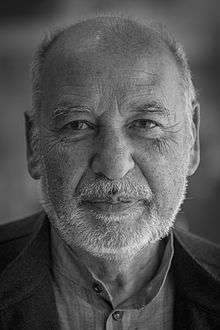Tahar Ben Jelloun
| Tahar Ben Jelloun | |
|---|---|
 Tahar Ben Jelloun (2013) | |
| Native name | الطاهر بن جلون |
| Born |
1 December 1944 Fes, French protectorate in Morocco |
| Occupation | Novelist, poet |
| Language | French |
| Nationality | Moroccan |
| Alma mater | Mohammed V University |
| Period | 1973–present |
| Notable works |
The Sand Child This Blinding Absence of Light |
| Notable awards |
Prix Goncourt (1987) Prix Ulysse (2005) |
| Website | |
|
taharbenjelloun | |
Tahar Ben Jelloun (Arabic: الطاهر بن جلون; born in Fes, French protectorate in Morocco, 1 December 1944) is a Moroccan writer. The entirety of his work is written in French, although his first language is Arabic. He became known for his 1985 novel L’Enfant de Sable (The Sand Child). Today he lives in Paris and continues to write. He has been short-listed for the Nobel Prize in Literature.[1]
Early life and career
Tahar Ben Jelloun was born in Morocco in December 1944. As a child, he attended an Arabic-French bilingual elementary school. He then studied in the Lycée Regnault in Tangier, Morocco, until he was 18 years old. He studied philosophy at Mohammed V University in Rabat.
After having been a philosophy professor in Morocco, he joined the group who ran the literary magazine Souffles in the mid-1960s. He wrote many pieces for the cultural magazine. He later participated in the student rebellion against “the repressive and violent acts” of the Moroccan police. In 1966, he was then forced into military camp as his punishment.
Five years later, his first collection of poems were published in Hommes sous linceul de silence (1971). Shortly thereafter he moved to Paris, France, and in 1972 began writing for Le Monde. He received his doctorate in social psychiatry in 1975.
Writing career
Ben Jelloun's 1985 novel L’Enfant de Sable (translated as The Sand Child) brought widespread attention. In 1987 he received the Prix Goncourt for his novel La Nuit Sacrée (The Sacred Night), making him the first Maghreb author to receive the award.
His 1996 novel Les raisins de la galère (Eng. The Fruits of Hard Work) is a reflection on racism and traditional Muslim ideas about women's place. The protagonist, Nadia (a young French women of Algerian origin), fights racism and exclusion to find her place in French society.
Ben Jelloun was awarded the International IMPAC Dublin Literary Award for Cette aveuglante absence de lumière (This Blinding Absence of Light) in 2004. In 2005 he received the Prix Ulysse for his entire body of his work.
In September 2006, Ben Jelloun was awarded a special prize for "peace and friendship between people" at the Lazio between Europe and the Mediterranean Festival.[2] On 1 February 2008, Nicolas Sarkozy awarded him the Cross of Grand Officer of the Légion d'honneur.
Selected works
- Harrouda (1973)
- Solitaire (1976)
- French Hospitality (1984)
- The Sand Child (1985)
- The Sacred Night (1987)
- Silent Day in Tangiers (1990)
- With Downcast Eyes (1991)
- State of Absence (1992)
- Corruption (1995)
- The Fruits of Hard Work (1996)
- Praise of Friendship (1996)
- L'Auberge des pauvres (1997)
- Racism Explained to My Daughter (1998)
- This Blinding Absence of Light (2000)
- Islam Explained (2002)
- La Belle au bois dormant (2004)
- The Last Friend (2006)
- Yemma (2007)
- Leaving Tangier (2009)
- The Rising of the Ashes (2009). ISBN 978-0-87286-526-6
- A Palace in the Old Village (2010)
- Par le feu (2011)
- L'Ablation (2014)
References and notes
- ↑ Interviews: Tahar Ben Jelloun, The Art of Fiction No. 159 theparisreview.org
- ↑ "Italy Lazio cultural festival awards Moroccan author". Morocco Times. Archived from the original on 25 November 2006. Retrieved 2006-09-25.
External links
- Rawafed: documentary interview Tahar Ben Jelloun "part one". Alarabiya.net
- Rawafed: documentary interview Tahar Ben Jelloun "part two". Alarabiya.net
- Homepage of Tahar Ben Jelloun
- Shusha Guppy (Fall 1999). "Tahar ben Jelloun, The Art of Fiction No. 159". The Paris Review.
- - "Dialogue interculturel et complaisance esthétique dans l'oeuvre de Tahar Ben Jelloun", Par Salah NATIJ, in website Ma'duba / Invitation à l'adab, Le Premier Amour est Toujours le Dernier moha le fou, moha le sage.
- "Tahar Ben Jelloun's The Rising of the Ashes", City Lights.
- "Tahar Ben Jelloun Art Review: The Roots of Times", Morocco Newsline, 15 December 2009.
- Tahar Ben Jelloun: The Arab Spring - The Comfortable Way to Take Part in a Revolution
- Ruth Schneider, "'“Democracy is not like an aspirin you dissolve in water'" (interview), Exberliner Magazine, 17 October 2011
- "Tahar Ben Jelloun (France)", Internationales Literaturfestival Berlin.
- Nicoletta Pireddu, "A Moroccan Tale of an Outlandish Europe: Ben Jelloun's Departure for a Double Exile" Research in African Literatures, 40 (3), Fall 2009: 16-36
